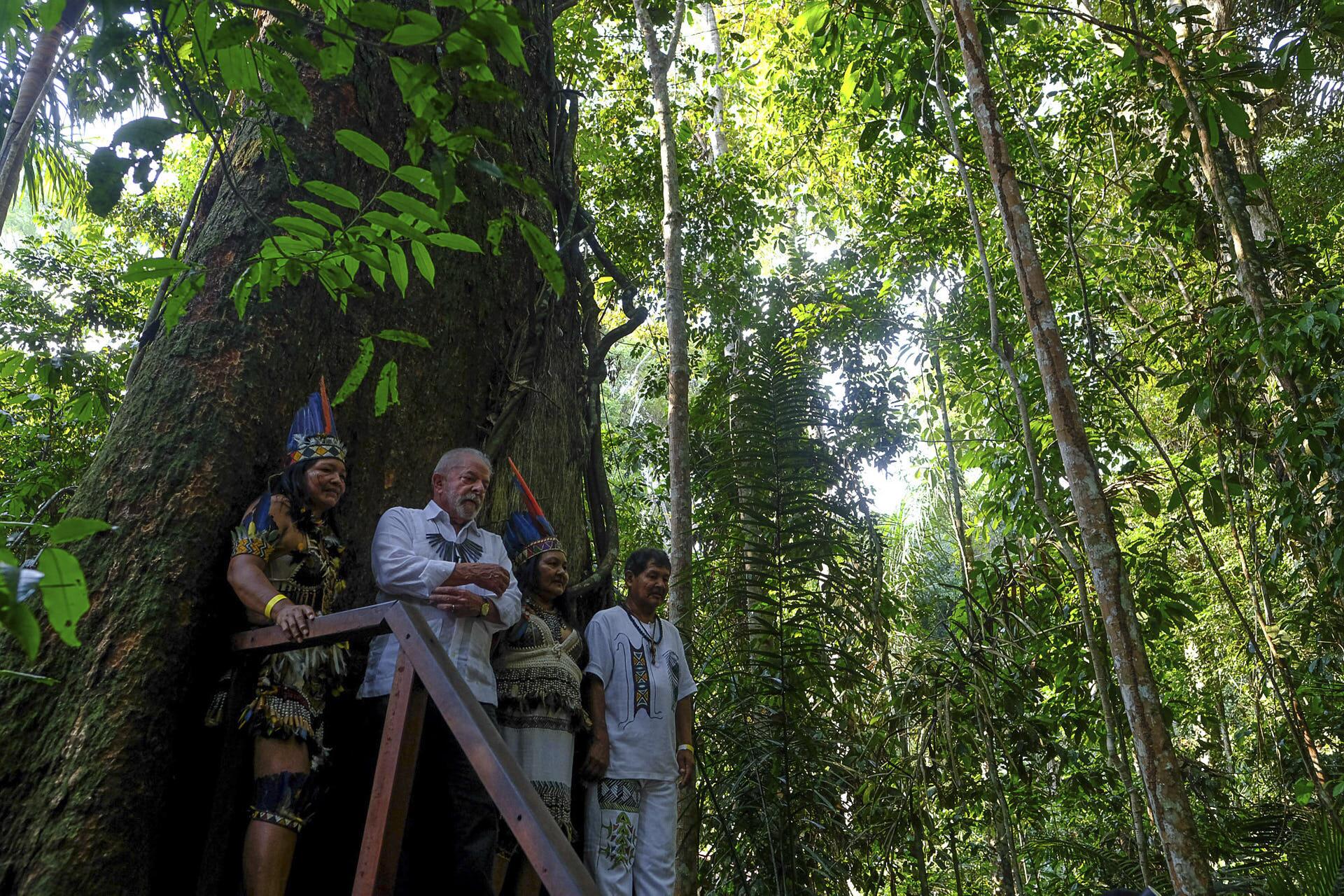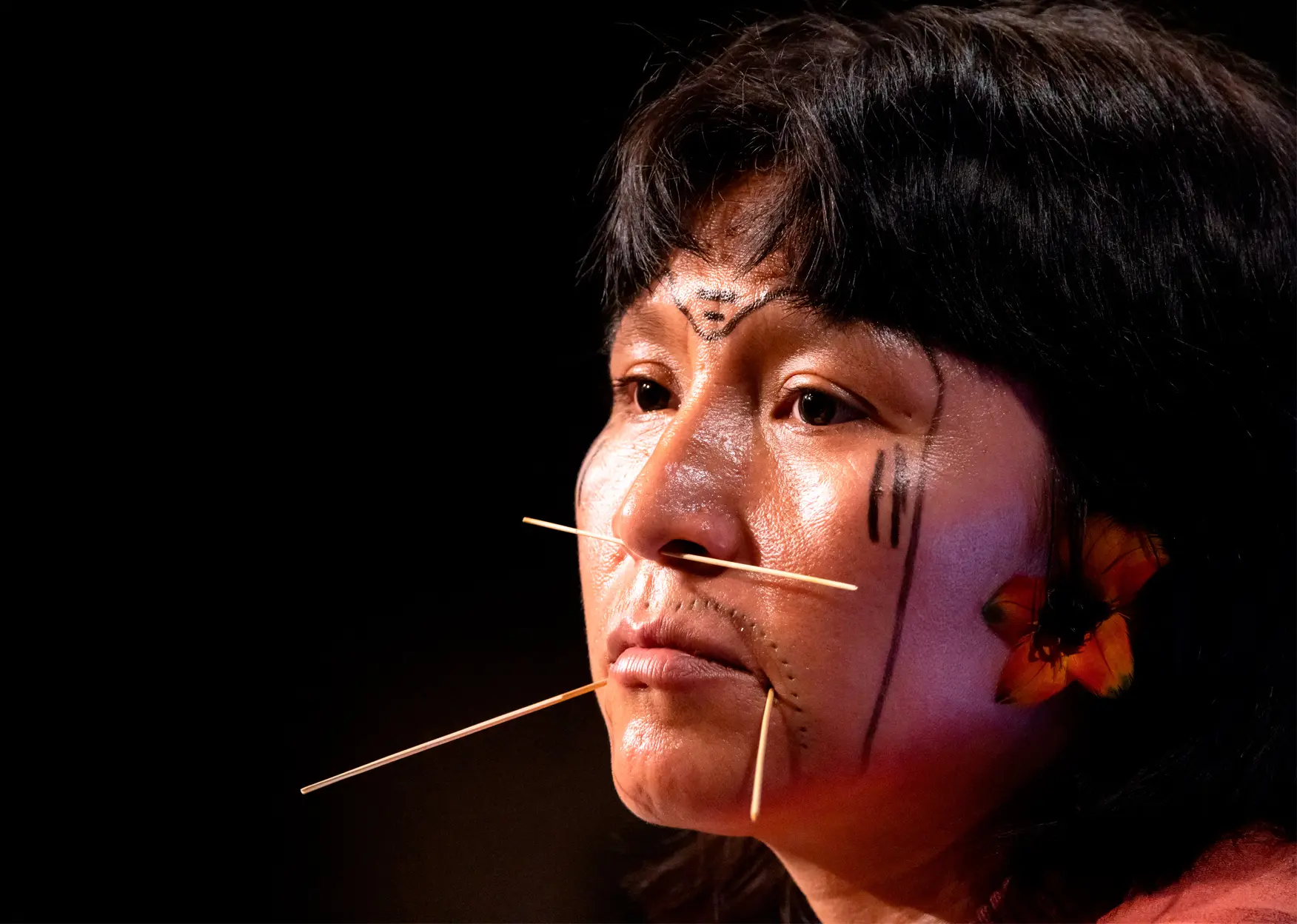After a mostly sickening year of fire and death in the Amazon, 2022 has ended with the possibility of revitalization. On the stroke of midnight, the nightmare of president Jair Bolsonaro’s presidency of Brazil will be over, and power will be passed to Luiz Inácio Lula da Silva, who has promised to protect indigenous lands and aim for zero deforestation by 2030. That’s not the only good news. The international mood has rarely been as supportive. At a United Nations biodiversity conference in Montreal this week, almost all of the world’s governments agreed on ambitious new targets to protect nature. Earlier this month, the European Union, which is the number one consumer of the planet’s forests, approved its strongest regulations yet on deforestation-free trade. None of these advances are enough by themselves to prevent the Amazon – and the world’s climate – from sliding past the point of no-return, but together they are the most promising set of developments in more than a decade. If they can be a starting point, rather than an end in themselves, the coming year could be a turning point for the forest and its people, and all the other human and non-human lives in this interdependent world. For this to happen, Lula’s new government needs to capitalise on this opportunity by acting boldly in its early months. There have been encouraging noises from the transition team on rebuilding the environment ministry, ending impunity for land grabbers and expelling wildcat miners from indigenous lands. But big strides will be needed on the demarcation of indigenous land and agrarian land reform to end violence against people and nature. Factional divisions, Congressional hostility and lobbying from extractive industries will be major obstacles, but here are six new year’s resolutions that we at Sumaúma believe Lula will, or should, make:
1. Build back stronger
In four years, Jair Bolsonaro shattered forest protections. The new government must not just piece them back together but also make them stronger. The transition team, including Jorge Viana, Nilto Tatto and Marina Silva, have asked Congress for an extra 536 million reais for the environment ministry, in addition to the previous budget. This would be money well spent. The breakdown of the additional funds includes 130 million reais for Ibama for field operation against illegal miners and loggers, 90 million for fire prevention by ICMbio and Ibama, 80 million reais for the conservation and management of federal conservation areas, and 200 million reais to ressurect “Bolsa Verde” (Green Grant) support for poor people living in forest areas, to maintain trees, rivers and nature. In addition, the environment ministry is expected to take back control over waterways and forest services, which were hived off to the agriculture ministry and development agency under Bolsonaro. To finance reforestation projects, the government would redirect environmental fines under a system that proved effective during the Temer administration. The ministry also plans greater coordination with subnational governments, an important bureaucratic step that would help the federal authorities to close local loopholes. The toughest ask, however is for 2,000 additional staff, which is essential to launch more investigations and put officers in the field. But no budget has been allocated yet for this. Expect a fight with Congress and a request to foreign donors.
2. Put Marina and Sonia front and center in the cabinet
At the time of publication, Lula had yet to finalise his new cabinet, amid rumours of in-fighting over key environmental positions, and lobbying by industry. Joênia Wapichana and Sônia Guajajara, two highly respected indigenous leaders, are running for the Ministry of Indigenous Peoples. Joênia, the first indigenous woman to be elected as a deputy, knows the internal politics of Congress in depth and was not re-elected for a new term. Sonia, on the other hand, is newly elected to the lower house so for her to occupy a ministry, would leave a void in a Congress that is otherwise largely hostile to the environment. Sonia is a leader of remarkable ability, with great capillarity and international recognition. There are signs that Lula has selected Sonia Guajajara to head the future Ministry of Indigenous Peoples, which will have limited budgetary powers but provide an important political platform.
A bigger fight is over the environment ministry, where the favourite is Marina Silva, who was arguably the world’s most effective and iconic environment minister during the first Lula administration from 2003 to 2006. As a former rubber tapper and union activist, she struck exactly the right balance between livelihood support and nature protection. She introduced policies that led to an 80% fall in Amazon deforestation, opposed agrotoxins and biofuels, and tried to block roads, dams and other infrastructure projects that threatened important areas of nature. Her problem was that she was so effective she made powerful enemies in the construction and agriculture sectors. Lula backed them instead of her, prompting Silva’s resignation and leading to a series of environmental reverses. The two reunited for this year’s election and Lula has agreed to Silva’s conditions on key environmental issues. She is opposed by the agribusiness and the financial sector but anyone else would be a blow to the environmental credibility of the new administration among domestic conservationists and foreign governments.
3. Demarcate and protect indigenous land (invaders, state presence)
The new government must send a strong signal that the state has returned to the Amazon, and that it will expand and protect indigenous territories that have been invaded by garimpeiros (illegal miners), land grabbers and criminal fishing gangs. One of the media blitzes in the first weeks or months of the new government will be a big operation or series of operations against illegal mining camps inside indigenous Yanomami, Munduruku or Kayapó territory. Expect Hollywood-esque images of forest protection agents swooping down in military helicopters, rounding up criminals, and then burning all the equipment in sight. How big and how effective will depend on who runs the operation. The initial raids will send a strong signal, but a long-term solution will take years and be much more complex because illegal mining camps are scattered all over the Amazon and often include co-opted indigenous people. Thousands of poor, untrained people who are driven out of these lands will need relocation and support to start different lives.
4. Punish deforesters, offer alternatives and share land fairly
Lula’s new team will also need to send a strong signal that the years of impunity are over for land grabbers and loggers. This is likely to come in the form of an “embargão” (a mass embargo) of thousands of companies and landowners involved in illegal deforestation. Marina proved the effectiveness of this last time she was environment minister by tracking down the money men who finance Amazonian land thefts and punishing them with business embargos, credit withdrawal, black-listing and fines. Whether or not she gets the post again, expect much more of the same between January and April. These punitive measures are much easier now because hi-tech satellite monitoring by groups such as MapBiomas can quickly and accurately identify where land is being cleared and who owns the land so there is less need to put boots on the ground. Embargo notices can be automatically sent out like speeding fines. The federal police will also be tasked with investigating shell companies so the real investors – often dentists, graphic designers and car salesmen in the south of Brazil – are caught and punished. Contrary to the myth pedaled by Bolsonaro, the vast majority of deforestation cases can be traced to a small, wealthy elite. The same clique of landowners are behind much of the violence in the Amazon, which must be addressed through agrarian reform that encourages sustainable smallholdings rather than ranches and monocultures.
5. Put nature and climate at the heart of ideology
Here is a battle that will not be resolved for decades, but the fight needs to start soon and if Lula can be won over, progressives the world over will have a great champion to lead their cause. The dividing line in politics used to be left versus right, socialist vs capitalism, Marx vs Smith. But these 18th and 19th century concepts are inadequate to address the challenges of a world pushed to environmental limits by a human population of eight billion that has destroyed 69% of wildlife. We need an economics that builds up natural abundance instead of running it down in the name of GDP productivity and consumption, and this must go hand in hand with politics of environmental justice that fights against climate apartheid and recognises the degredation of fresh air, clean water and fertile soil is the greatest theft from the poor in history. Changing the core beliefs of Lula will not be easy. He is an old-school trade unionist who used his previous presidency to promote a 20th century national development programme of roads, dams, increased consumption, higher credit and massive state subsidies for the oil, beef, soy, mining and construction industries. In recent speeches he sounds more like a 21st century president, who recognises great leadership is not just about rapid economic growth but the wellbeing of future generations. After his election victory, Lula emphasised the need to fight for the environment, indigenous rights and zero deforestation by 2030. For his first overseas trip as president-elect, he attended the COP27 climate summit at Sharm el Sheikh. Marina has persuaded him that zero deforestation goals must apply not only to the Amazon, but to other globally important biomes such as the Pantanal wetlands and the Cerrado savanna. It is important that he continues to pursue this bigger vision in the new year.
6. Persuade wealthy nations to pay more for stewardship of the global commons
Nature diplomacy needs to be the foundation of Brazil’s foreign policy under Lula. This will be a means of asserting moral and political leadership, of lobbying rich countries to pay for the maintenance of global life-support systems, and of ensuring the livelihoods of current and future, human and non-human generations. As president of the world’s most biodiverse nation, Lula is in an ideal position to push this agenda and the timing is perfect thanks to new developments in Europe and the United Nations.
The fate of the rainforest is not decided in the Amazon, but in the overseas markets that buy its beef, wood, soy and iron ore. In this regard, the European Union, which is the world’s biggest consumer of forest products, is indirectly, the world’s biggest deforester. So it was very good news that the EU had adopted new regulations to impose strict traceability-requirements on forest products, tighter border checks and punishments for companies and countries that fail to halt unsustainable deforestation or degradation. This is a big step forward from the previous approach, which relied on voluntary actions, and it is hoped the Amazon’s two other main customers — China and the United States — will adopt similar measures. With a little encouragement from the government, Brazilian beef and soy companies would then have a strong incentive to increase productivity by rehabilitating degraded land rather than by clearing forest. This will also be good leverage to persuade companies like JBS that they must adopt a beef moratorium.
Lula should also use Brazil’s new biodiversity superpower pact with Congo and Indonesia to capitalise on the new global deal on biodiversity, just agreed at the United Nations COP in Montreal, which promises $30bn to ensure 30% of nature is protected by 2030. A substantial share of this money must go to the Amazon and its people. The Montreal agreement also stressed the importance of indigenous communities in managing forests and other crucial eco-systems, which aligns with the priorities of the new government in Brazil. Lula — ideally with Marina and Sonia or Joênia — can become the face of this new approach to nature, setting a strong example at home and cajoling rich nations to keep and exceed their promises, which are still not enough.
They have a strong argument. In many wealthy nations, governments pay farmers to maintain water sources and forests, rather than turn them into monocultures. The same needs to be done on a global scale, with economically wealthy countries and companies paying nature-rich nations and traditional communities to maintain essential global commons. The case for this will be hard to dispute if Brazil can demonstrate effective action on deforestation. In that regard, the outside world must contribute pressure as well as support and money. Lula faces many battles in the new year against the agriculture lobby and construction companies. He needs to be able to argue the international community insists on nature protection and is willing to pay for it.
7. Hurry!
The new government needs urgency and ambition. Leading climate and forest scientists, such as Carlos Nobre and Thomas Lovejoy have warned the Amazon is close to a tipping point, after which the humid, biodiverse rainforest will not be able to recover and it will degrade instead into a dry savanna. That calamity is said to strike when deforestation is between 20 and 25%. The cleared area now is 17% with another 17% degraded so this point is close. In some areas it has already arrived: droughts are growing longer, trees are more vulnerable to fire and so the forest emits more carbon than it absorbs, turning it from a climate friend to a climate foe. Given this worsening calamity, the Amazon crisis is far more critical than it was when Lula was last in power. Yet most of the work done by his transition team has been focussed on rebuilding the capacity that was lost under Bolsonaro rather than adding new measures that take account of the increased danger. There are more ambitious steps that could be pushed by Brazil – more demarcation, a major reforestation program and a moratorium on beef from deforested land. But bold policies need strong support from the outside – and plenty of cash. Without these, Lula will simply slow the arrival of Amazonian collapse, rather than prevent it.

Lula at the Museum of the Amazon (Musa), in Manaus, during a meeting with scientists and indigenous leaders in August 2022. Photo: Alberto César Araújo/Amazônia Real




